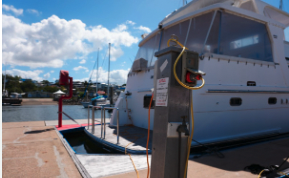
Electrical standards and licences for Queensland regulated ships
By Mark Smith
CEng, CMarEng, FIMarEST, BAppSc(MarEng)
Engineering Surveyor
Accredited Marine Surveyor: AMSA – 3242-6148 4
Qld EC lic. 73995
eCMID – AVI00674
Based in Brisbane, Australia, Mark Smith is an AMSA Accredited Marine Surveyor and a Chartered Marine Engineer with over 40 years’ experience. Mark is a member of the Australasian Institute of Marine Surveyors, and Fellow of the Institute of Marine Engineering, Science and Technology (IMarEST). Mark is the owner of SET Maritime & Electrical, designer of the revolutionary new shore connection device – ESHORE.
In June 2021 Maritime Services Queensland (MSQ) released an updated Marine Information Bulletin covering the standards applying to electrical installations on Queensland regulated ships and work that must be performed by appropriately licensed electrical workers.
The term for a regulated ship has been defined in Queensland Legislation ‘Transport Operations (Marine Safety) Regulation 2016’ as Vessels that are not ships, making reference to the Marine Safety (Domestic Commercial Vessel) National Law Regulation 2013 for this definition.
This Regulation identifies that each of the following are a ship: boat; canoe; dinghy; dragon boat; kayak; pontoon; and tinnie.
This legislation has mandated that all ‘recreational ships’ and ‘other Queensland regulated ships’ are to comply with AS/NZS 3004: 2014 Electrical installations – Marinas and Boats – Boats.
What are your responsibilities?
As per the MSQ Bulletin, “Under the Transport Operations (Marine Safety) Act 1994 boat owners and other persons involved with boats have a general safety obligation regarding the condition of boats, including the condition of a boat’s electrical installation.
Low voltage electrical installations and electrical equipment on boats in Queensland must comply with the requirements of the Electrical Safety Act 2002 (ESA).
The ESA provides that only licensed electricians may perform electrical work. A licensed electrician must ensure that electrical work is in accordance with Australian/New Zealand Standard 3000 known as the wiring rules (AS/NZS 3000).”
What standards apply to electrical installations on boats?
Your electrician must ensure that the low voltage installation complies with the wiring rules.
Provisions in AS/NZS 3000: 2007 apply to marinas and boats registered in Queensland – 7.8.2.4. Electrical installations in marinas and recreational boats need to comply with AS/NZS 3004. Note 2 of clause 7.8.2.4, refers to the National Standard for Commercial Vessels – Part C Construction – Subsection 5B Electrical Edition 2 (NSCV Part C 5B).
AS/NZS 3004: 2014 Electrical installations – Marinas and recreational boats – Part 2: Recreational boat installations specifies requirements for the design, construction and installation of electrical systems in boats registered in Queensland that have a length of up to 50 metres and are designed for use on inland waters or at sea.
Another related standard is the NSCV C 5B, published by the National Marine Safety Committee in 2005. This is a commercial vessel standard that is also suited to electrical installations on boats registered in Queensland. This standard provides additional requirements and variations to AS/NZS 3000 necessary to reflect the requirements of the marine industry and the particular environment on boats, while satisfying the fundamental safety requirements of section 1 of AS/NZS 3000.
How do I know if I am compliant?
To ensure compliance with the electrical standards you simply need to have the electrical work on your boat performed by a licensed electrician.
Further information
Marine safety legislation and Marine Information Bulletins about the safe operation of boats are available on the Maritime Safety Queensland website at www.msq.qld.gov.au.
Copies of the Electrical Safety Act 2002, the Electrical Safety Regulation 2013, Codes of Practice and other publications regarding obligations for electrical safety are available as downloads from the Electrical Safety Office website (www.eso.qld.gov.au) or call 1300 650 662.
Australian Standards are available from SAI Global Ltd at www.saiglobal.com
Source: May 2017 Maritime Services Queensland (MSQ) Marine Information Bulletin